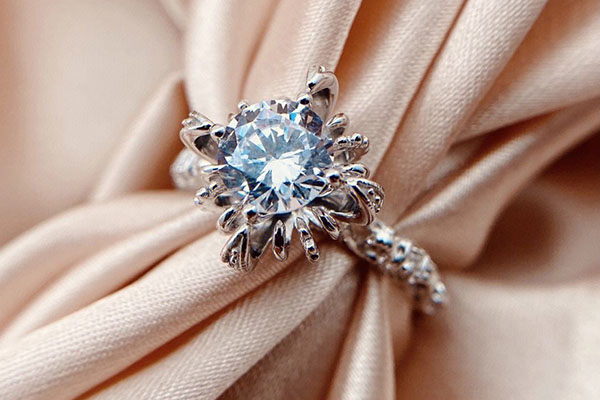Large intestine meridian of hand-Yangming is one of the twelve meridians, and one of the meridians of hand-three yang,Corresponding to the Lung Meridian of hand-Taiyin. The upper part of Large intestine Meridian is connected to the index finger of Lung Meridian, and the lower part is connected to beside the nose of Stomach Meridian. The meridians are distributed on the index finger,front of the upper limbs, front of the shoulders,neck, cheeks, and nose.
There are 20 points on one side of the large intestine meridian, 14 points on the radial side of the upper limbs, and 6 points on the shoulder, neck and face,including: Shangyang, Erjian, Sanjian, Hegu, Yangxi, Pianli, Wenliu, Xialian, Shanglian, Shousanli, Quchi,Zhouliao, Shouwuli,Jianyu,Binuo,Jugu, Tianding, Futu, Kouheliao, Yingxiang.
Large intestine meridian acupoint is commonly used to treat head and face,ENT system, throat diseases, fever and other diseases in the meridian circulation parts.Pay attention to the angle and depth of acupuncture Tianding and Futu.
Large Intestine Meridian Pathway
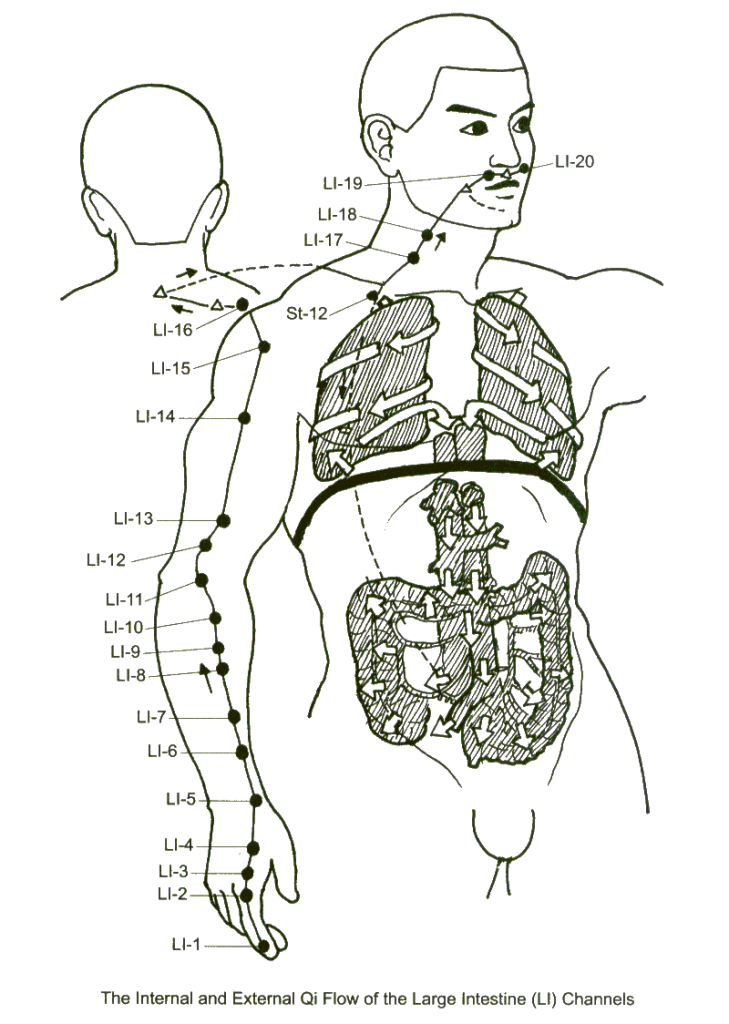
Large intestine meridian starts from the radial side of the index finger (Shangyang), goes up along the radial side of the index finger, and goes between the two bones (the first and second metacarpal bones), and enters the inside two tendons (Yangxi), along the radial side of the forearm, upwards into the outer side of the elbow curve (Quchi), and then upwards along the outer side of the upper arm to the shoulder (Jianyu),connects to Dazhui point( Du Channel), and then enters the clavicle forward,connects the lungs, penetrates the diaphragm downwards. Its branch from the supraclavicular fossa to neck, through cheeks, into lower teeth, and come back to the lips on both sides, cross left and right at Renzhong acupoint, and to the nostrils side (Yingxiang). The Qi connects with the Stomach Meridian of Foot-Yangming.
Large Intestine Meridian Acupuncture Points
LI 1 Acupuncture Point(Shangyang)
Location:0.1 cun posterior to the corner of the nail on the radial side of the index finger.
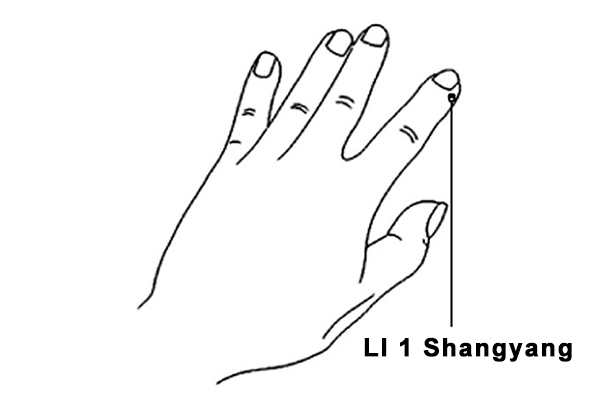
Usage:
- Sore throat, toothache, cheek swelling, pinked eyes, tinnitus and deafness;
- Fever, sweating, full chest, coughing and wheezing;
- fainting, stroke and coma;
- Numbness of fingers;
- Toothache, pharyngitis, laryngitis, tonsillitis, mumps, cerebral hemorrhage, high fever, etc.
LI 2 Acupuncture Point(Erjian)
Location:On the radial side of the index finger distal to the 2nd metacarpophalangeal joint in a depression at the border of the red and white skin.
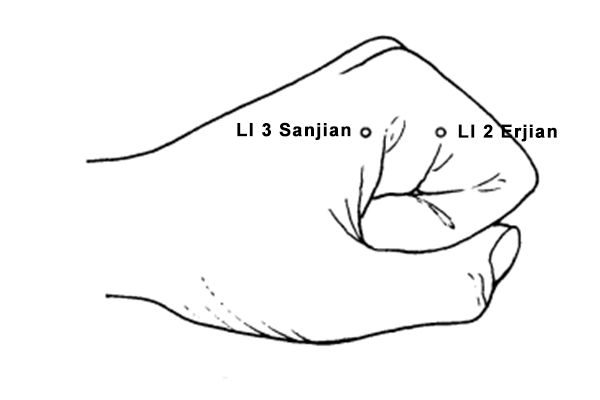
Usage:
- Headache, sore throat, toothache, cheek swelling, eye pain, epistaxis, facial paralysis;
- Finger swelling, pain, numbness, unfavorable flexion and extension;
- Pharyngitis, laryngitis, tonsillitis,stye,Frozen shoulder etc.
LI 3 Acupuncture Point(Sanjian)
Location:On the radial side of the index finger, proximal to the head of the 2nd metacarpal bone.
Usage:
- Body heat, headache, sore throat, dry mouth, toothache, epistaxis and eye pain;
- Chest distress, wheezing, abdominal distension and bowel, diarrhea and dysentery;
- shoulder and arm pain, upper limb paralysis; fingers and back of hands swelling and pain, poor flexion and extension of fingers,shoulder periarthritis.
- Tonsillitis, toothache, trigeminal neuralgia, acute conjunctivitis, glaucoma, etc.
Location:In the middle of the 2nd metacarpal bone on the radial side.
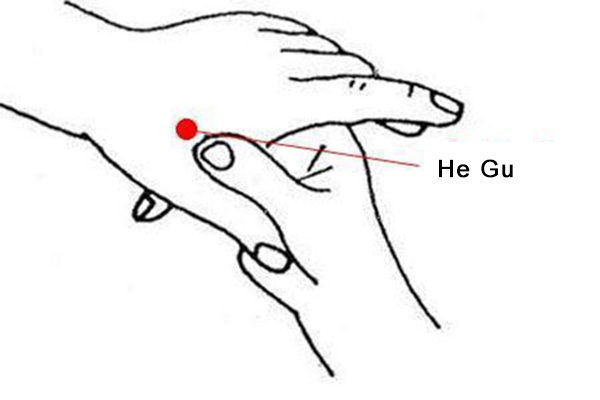
Usage
- Relieve the symptoms of carsickness-Before getting on the car, put ginger on the child’s belly to relieve the symptoms of carsickness. If you find child has symptoms of carsickness, you can press his Hegu acupoint properly, or pinch the Neiguan acupoint with your thumb to alleviate the symptoms of carsickness.
- Pain relief massage-Place the palm of the right hand on the back of the left hand, and pinch the Hegu acupoint,50 times each.Left hand first massaged,then do right hand for men,the opposite for women. Massage benefits: Pressing and kneading Hegu acupoints can relieve these pain,such as: toothache, sore throat, headache, and abdominal pain. It can also treat colds, dizziness, drowsiness, tinnitus, deafness, nerves Weakness and other diseases,acute infantile convulsion for child.
- Relieve constipation and prevent dementia-Long-term constipation is the important factor caused the decline of the intelligence of the elderly, and about 80% of elderly constipation are easy to suffer Alzheimer’s disease. massage the Hegu acupoint on your hand and then rub your belly in a clockwise direction to relieve constipation.
- Relief of hypotension-Research found that frequent pressing of kneading Hegu acpoints has a certain boosting effect Therefore, patients with low blood pressure can often press the Hegu acupoint.
- Improve immunity -Massaging the Hegu acupoint has a adjustment effect on blood cells, and can enhance the phagocytic ability of people’s white blood cells, thereby to archive disease prevention.
LI 5 Acupuncture Point(Yangxi)
Location:On the radial side of the wrist in a depression between extensor pollicis longus and brevis tendons, found when the thumb is tilted upward.
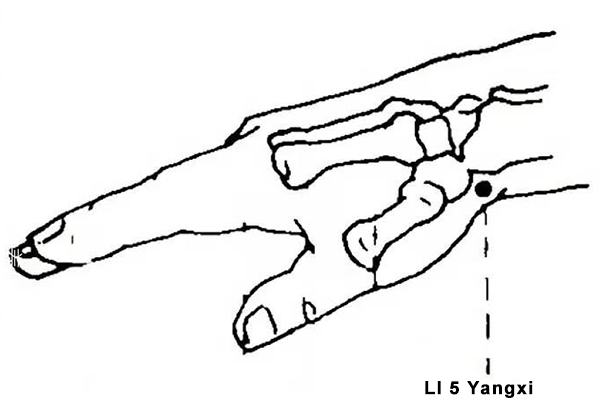
Usage:Wrist joint and surrounding soft tissue diseases, neurological headache, eye pain, tinnitus, deafness, toothache, pediatric indigestion, hemiplegia, tonsillitis, etc.
LI 6 Acupuncture Point(Pianli)
Location:3 cun above the crease of the wrist on the LI 5 to LI 11 line.
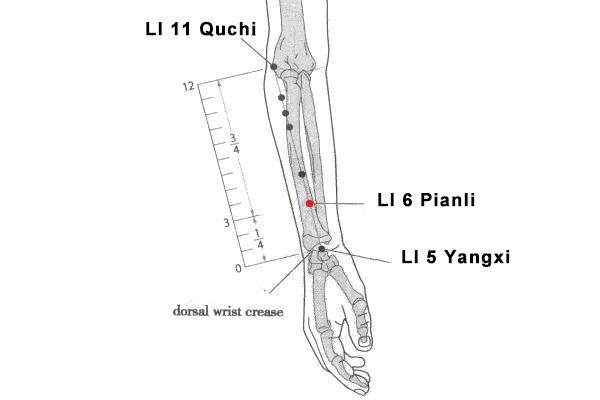
- Tinnitus, epistaxis.
- Sore arms.
- fullness of the abdomen
- Edema.
Clinical usage:
nose bleeding, facial nerve palsy, tonsillitis, forearm neuralgia, deafness, tinnitus, toothache, etc.
LI 7 Acupuncture Point(Wenliu)
Location:5 cun above the crease of the wrist (LI 5).
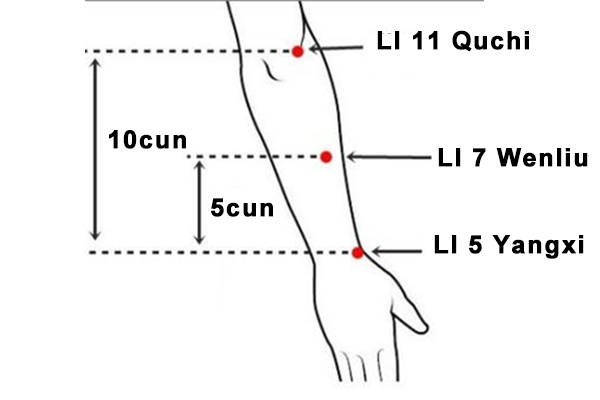
Usage:
- Acute bowel, abdominal pain and other intestinal diseases.
- Boils.
- Head and face disease syndromes such as headache, facial swelling, sore throat and so on.
- Sore shoulders and backs.
LI 8 Acupuncture Point(Xialian)
Location:4 cun below LI 11 on the LI 5 to LI 11 line.
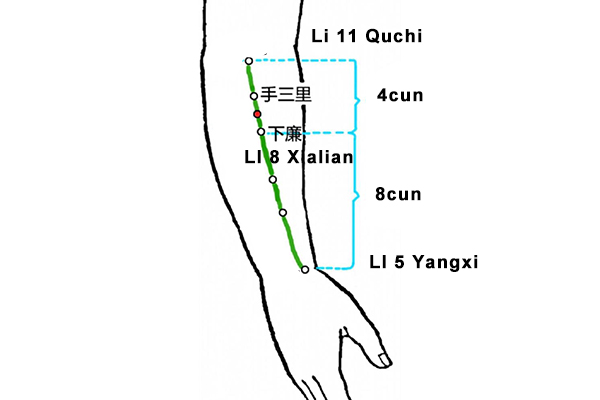
Usage:
- Forearm and elbow pain, bladder palsy, hematuria, lower abdominal cramps, abdominal pain, precordial pain.
- Headache, dizziness, eye pain.
- asthma, bronchitis, pleurisy, tuberculosis, mastitis, etc.
LI 9 Acupuncture Point(Shanglian)
Location:3 cun below LI 11 on the LI 5 to LI 11 line.
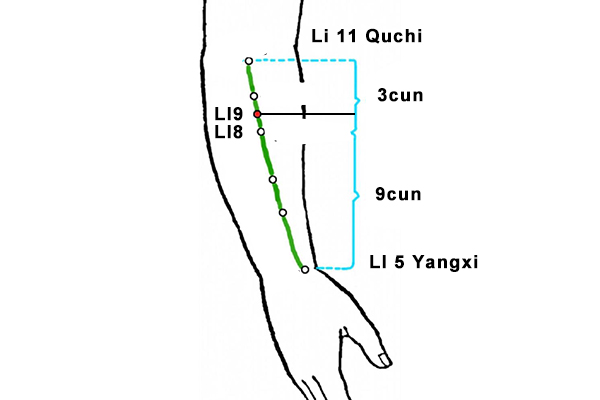
Usage:
- Abdominal pain, bowel, diarrhea.
- Headache, dizziness, hemiplegia.
- Arm and shoulder pain, knee swelling, wheezing.
- Difficulty urinating, etc.
LI 10 Acupuncture Point(Shousanli)
Location:2 cun below LI 11 on the LI 5 to LI 11 line.
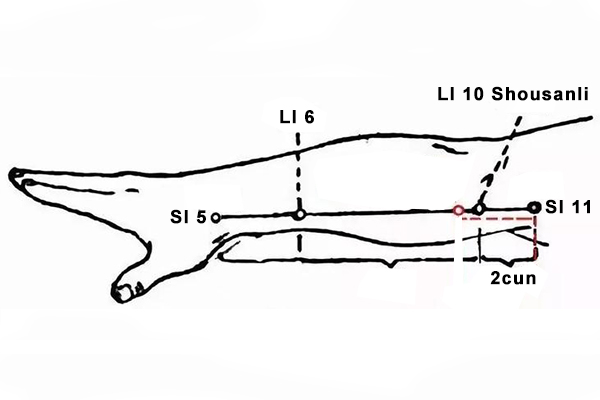
Usage:
- Movement system diseases: relieve back pain, shoulder and arm pain, upper limb paralysis, hemiplegia, etc.;
- Digestive system diseases; relieve ulcer disease, enteritis, dyspepsia, etc.;
- Diseases of the ENT system: relieve toothache, stomatitis, etc.;
- Others: Relieve cervical lymphatic tuberculosis, facial nerve palsy, colds, mastitis, etc.
LI 11 Acupuncture Point(Quchi)
Location:At the lateral end of the transverse cubital crease midway between LU 5 and the lateral epicondyle of the humerus.
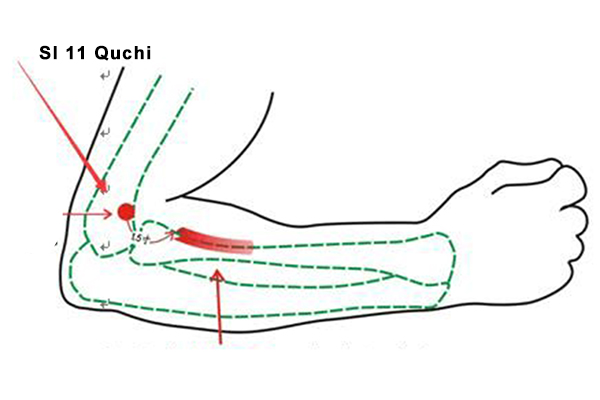
Usage:
- The sequelae of cerebrovascular disease, frozen shoulder, elbow arthritis.
- High blood pressure, skin disease, influenza, pneumonia, tonsillitis, pharyngitis, toothache, sty, mastitis, goiter, allergic diseases, etc.
LI 12 Acupuncture Point(Zhouliao)
Location:With the elbow flexed, on the radial side of the upper arm 1 cun above LI 11 at the border of the humerus (1 cun superolateral to LI 11).
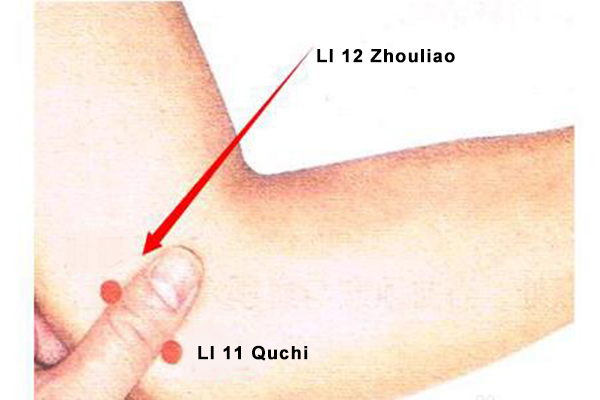
Usage:l
- Pain in elbow and arm, numbness, contracture, scrofula.
- Upper limb paralysis, brachial neuralgia, frozen shoulder, external humeral epicondylitis and other elbow joint diseases.
LI 13 Acupuncture Point(Shouwuli)
Location:3 cun above LI 11 on the LI 15 to LI 11 line.
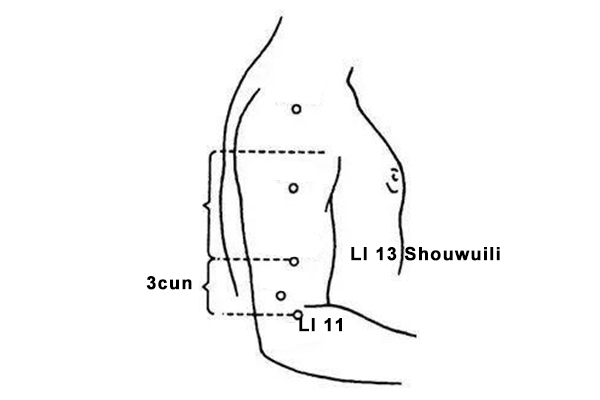
Usage:
- Hemoptysis,pneumonia,pleurisy,intercostal neuralgia, cervical tuberculosis, tonsillitis, hemiplegia,
- upper limb pain.
- phobia, lethargy, etc.
LI 14 Acupuncture Point(Binao)
Location:On the radial side of the upper arm, 7 cun above LI 11 at the insertion of the deltoid muscle.
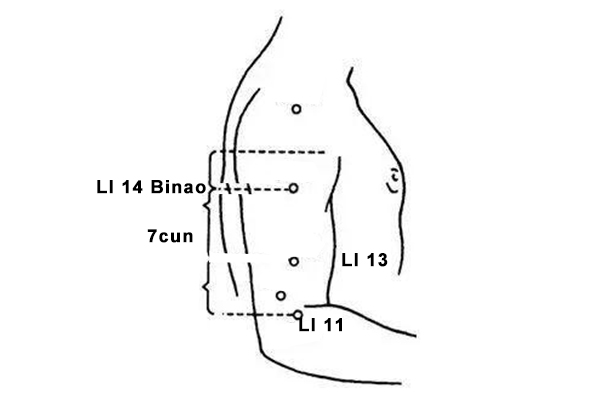
- Shoulder and arm pain, stiff neck, periarthritis, acute conjunctivitis, etc.
- thyroid disease, scrofula.
Clinical Usage:Periarthritis of the shoulder joint, neck lymphatic tuberculosis, etc.
LI 15 Acupuncture Point(Jianyu)
Location:Anterior and inferior to the acromion in a depression found with the arm abducted.
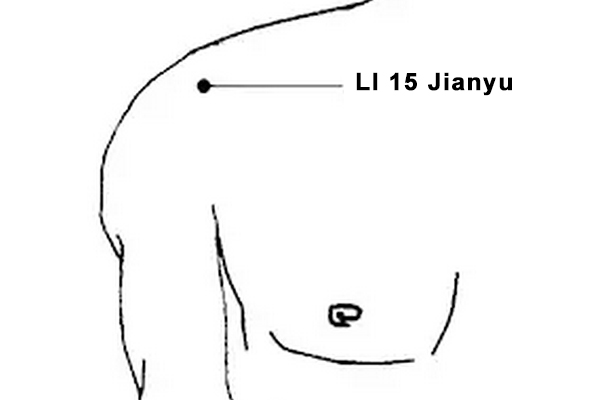
Usage:Urticaria,Frozen shoulder, stroke, hemiplegia, high blood pressure, hyperhidrosis, arm weakness, shoulder and arm pain, arm contracture, shoulder pain, upper limb discomfort.
Location:In the upper aspect of the shoulder between the acromial extremity of the clavicle and the spine of the scapula.
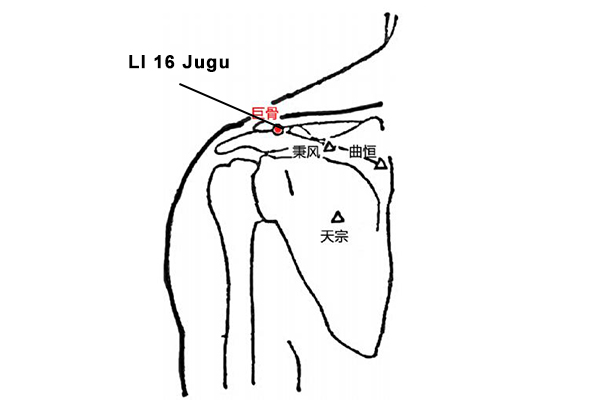
Usage:
- Scrofula,thyroid disease.
- Urticaria.
- epilepsy, vomiting blood, shoulder and back pain, inflexibility, hemiplegia, etc.
LI 17 Acupuncture Point(Tianding)
Location:On the lateral side of the neck, 1 cun below LI 18 on the posterior border of the SCM.
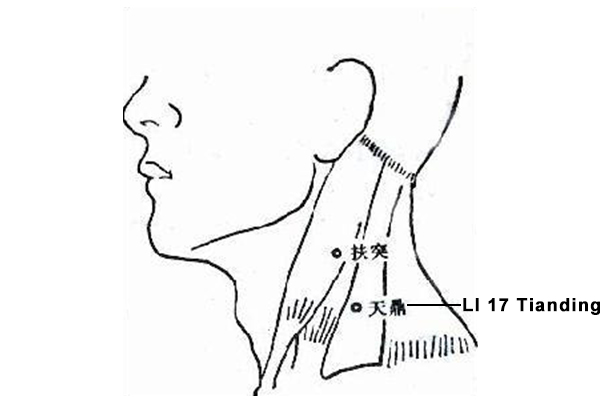
Usage:
- Sudden loss of voice, sore throat, tonsillitis, cough,scrofula, thyroid disease, etc.
- upper limb numbness.
Location:Level with the tip of the Adam’s Apple between the sternal and clavicular heads of the SCM.
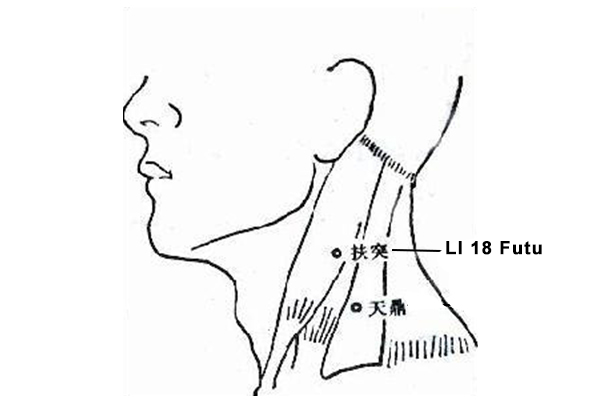
Usage:Cough and wheezing, sore throat, dysphagia, sudden loss of voice, thyroid disease, scrofula, etc.
LI 19 Acupuncture Point(Heliao)
Location:Directly below the lateral margin of the nostril at the level of GV 26.
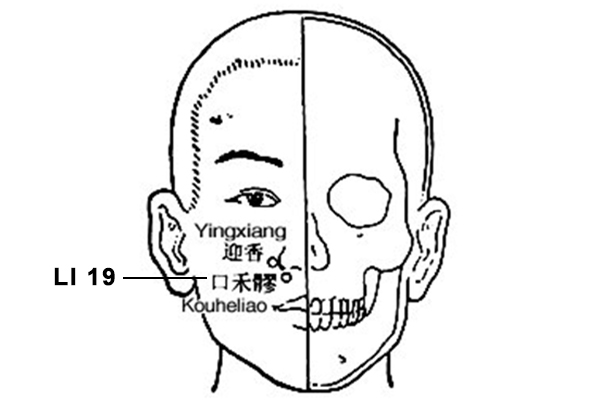
Usage:Rhinitis, nasal congestion,epistaxis,facial paralysis and lockjaw etc.
LI 20 Acupuncture Point(Yingxiang)
Location:In the nasolabial groove, level with the midpoint of the lateral border of the ala nasi.
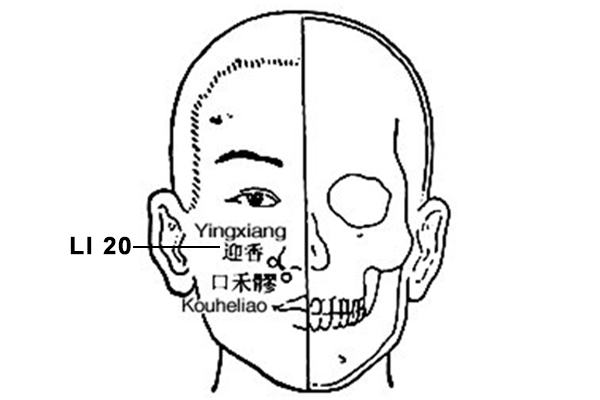
- Efficacy:Remove wind-heat,mediate nostril,This point is located near to the nose,the Qi flow directly through the nostril,so it is very beneficial for opening the meridians and activating the collaterals, and mediate nostril. It is a crucial point for various nose diseases.
- Symptoms: acute and chronic rhinitis, sinusitis, nose bleeding, facial nerve palsy, facial itching, facial swelling, biliary ascariasis, constipation, etc.
